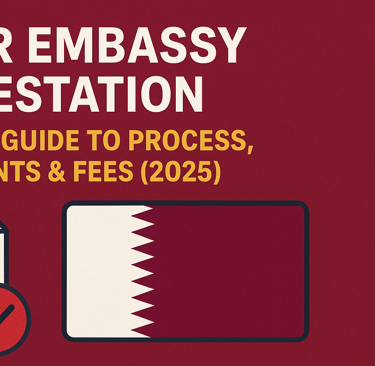Qatar Embassy Attestation: Complete Guide to Process, Documents & Fees (2025)
8/18/20254 min read


Understanding Qatar Embassy Attestation
Embassy attestation is an essential process that verifies the authenticity of documents intended for use in Qatar. This formal verification is particularly significant for expatriates, students, and professionals who aim to work, live, or conduct business in the country. Attestation serves as a safeguard for all parties involved, ensuring that the documents presented comply with both local regulations and international standards.
The importance of attestation cannot be overstated. Documents that are frequently subject to this process include educational certificates, marriage licenses, and business contracts, among others. Without proper attestation, these documents may not be recognized by Qatari authorities, which can lead to complications in legal processes, employment, or even residency applications. As such, embassy attestation acts as a bridge, affirming the validity of such documents and facilitating the requisite approvals necessary for various transactions in Qatar.
In addition to legal recognition, the attestation serves a broader purpose by providing certainty and confidence in personal and professional relationships. For instance, universities may require attested educational certificates from prospective international students to confirm their qualifications before admitting them. Similarly, employers may ask for attested documents from job applicants to verify their professional backgrounds and credentials. This process not only simplifies verification but also significantly aids in expediting administrative procedures, which can often be time-consuming.
Common scenarios that necessitate the attestation of documents include application processes for work visas, further education, and business licenses. In each of these instances, the accuracy and credibility of presented documents are crucial. Thus, understanding the embassy attestation process is vital for anyone planning to engage with the Qatari system, as it ensures the success of their endeavors in the country.
Required Documents for Attestation
When embarking on the process of embassy attestation in Qatar, it is essential to gather specific documents that will facilitate a smooth and efficient verification procedure. The required documentation typically falls into two categories: personal documents and professional documents.
Personal documents primarily include your passport, which serves as a crucial identifier. Alongside your passport, educational certificates such as diplomas, degrees, and transcripts are necessary, particularly if they pertain to educational qualifications you wish to utilize in Qatar. If you are married, having your marriage certificate attested is often a requirement, especially when applying for a residence visa or if the certificate is needed for family-related applications. It is imperative to have these personal documents translated into Arabic if they are issued in another language, as official institutions in Qatar might necessitate this for proper validation.
Turning to professional documentation, employment letters and business registration papers are vital for individuals seeking work or business opportunities in Qatar. An employment letter should be on the company’s letterhead, stating your position and duration of employment, while business registration documents must include the commercial registration certificate and licenses applicable to your business activities. As with personal documents, any professional documents not originally in Arabic should be accompanied by a certified Arabic translation.
Common mistakes to avoid during this preparation phase include overlooking the need for translation, failing to ensure that all documents are recent and valid, and not verifying the specific requirements as per the Qatar embassy’s guidelines. By being meticulous in your document compilation and addressing these nuances, the attestation process can be executed more efficiently, ensuring compliance with the legal frameworks in Qatar.
Step-by-Step Process for Attestation
The attestation process, particularly for documents intended for use in Qatar, requires a systematic approach to ensure compliance with legal standards. The first step involves determining the type of document that requires attestation; this could be a birth certificate, marriage certificate, educational degree, or other legal documents. Once identified, it is essential to gather the required documentation, including photocopies of the original documents and identification proof.
Next, the document must be verified by the pertinent local authority. For educational documents, this typically involves the Ministry of Education or similar entities. For other types of documents, you may need to consult the Ministry of Foreign Affairs in your home country. This verification stage is critical, as it validates the authenticity of your documents before submission for attestation.
After verification, the documents must be submitted to the relevant Qatar Embassy or Consulate. Ensure that you have completed any necessary forms and supplied all required fees to avoid delays. It is advisable to call the embassy or check their official website for specific submission requirements and hours of operation, as they can fluctuate.
Once submitted, the processing time can vary. Generally, it may take anywhere from a few days to a couple of weeks, depending on the embassy's workload and whether the documents have been correctly prepared. Tracking the status of your application through the embassy's contact methods may provide added peace of mind.
To expedite the process, you may consider using a document clearing service, which can assist with handling administrative tasks and ensure that your documents are in order. This additional aid can be beneficial, especially in meeting the intricate requirements of Qatari authorities.
Fees and Additional Considerations
The process of Qatar embassy attestation involves various fees that can differ markedly depending on the type of document, the urgency of service, and the specific charges applied by the embassy. As of 2025, individuals seeking attestation should expect a range of fees, typically starting from a base charge for standard documents such as educational certificates or marriage licenses, which might rise depending on the intricacy and verification requirements. For instance, while basic attestation might cost around $50 to $100, additional fees may apply for documents requiring special verification or expedited processing.
It is crucial to note that urgent service typically incurs additional costs. If you require same-day service, fees can escalate substantially, reflecting the priority service rendered by the embassy. Furthermore, various document types may necessitate different processing times and corresponding fees. For instance, legal documents often require more meticulous verification, which can impact the total cost of the attestation process. Therefore, it is advisable to account for a potential variance in fees based on the specific documents in question.
In addition to the direct fees charged by the embassy, applicants should be prepared for potential ancillary costs. These may include charges for translation services if the documents are not in Arabic or English, courier fees for sending documents to and from the embassy, and consultancy fees for professional services rendered to guide through the process. Budgeting for these additional expenses is essential to prevent unforeseen financial burdens.
Lastly, readers should stay informed about any updates or changes in the fee structure. Keeping abreast of such changes will enhance your preparedness and ensure a smooth attestation experience. As you navigate the process, always confirm the latest fee schedule directly with the embassy or through official channels to avoid any ambiguities.
